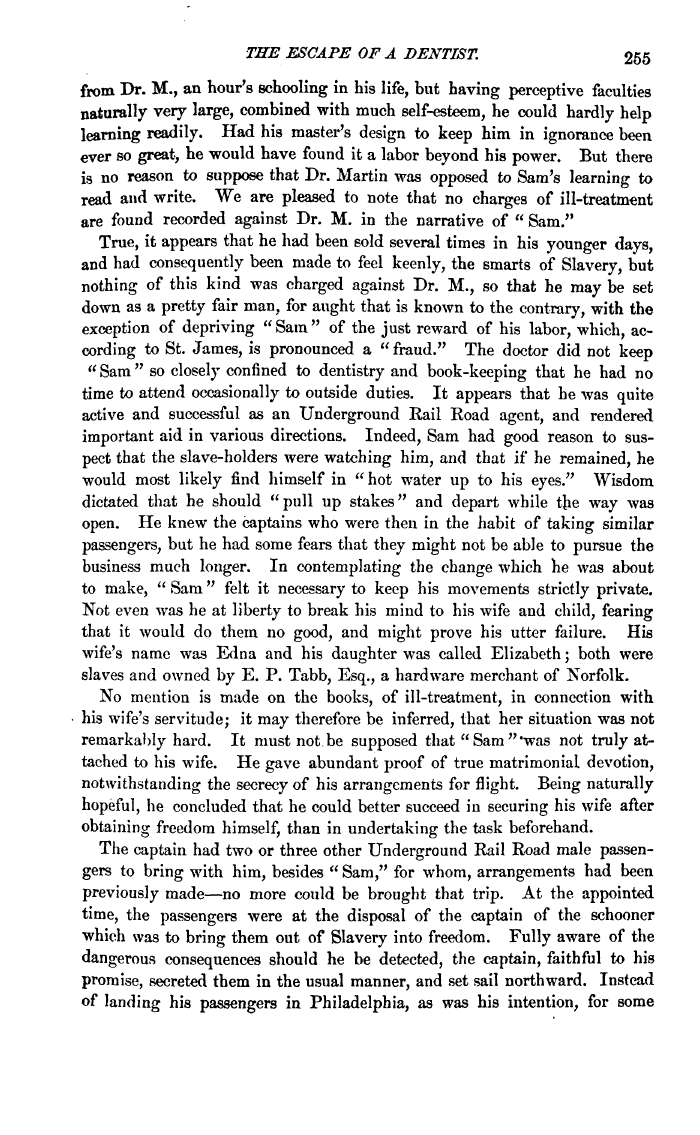 |
||||
 |
||||
| THE ESCAPE OF A DENTIST. 255 from Dr. M., an hour's schooling in his life, but having perceptive faculties naturally very large, combined with much self-esteem, he could hardly help learning readily. Had his master's design to keep him in ignorance been ever so great, he would have found it a labor beyond his power. But there is no reason to suppose that Dr. Martin was opposed to Sara's learning to read and write. We are pleased to note that no charges of ill-treatment are found recorded against Dr. M. in the narrative of " Sam." True, it appears that he had been sold several times in his younger days, and had consequently been made to feel keenly, the smarts of Slavery, but nothing of this kind was charged against Dr. M., so that he may be set down as a pretty fair man, for aught that is known to the contrary, with the exception of depriving "Sam" of the just reward of his labor, which, according to St. James, is pronounced a " fraud." The doctor did not keep " Sam " so closely confined to dentistry and book-keeping that he had no time to attend occasionally to outside duties. It appears that he was quite active and successful as an Underground Rail Road agent, and rendered important aid in various directions. Indeed, Sam had good reason to suspect that the slave-holders were watching him, and that if he remained, he would most likely find himself in " hot water up to his eyes." Wisdom dictated that he should "pull up stakes" and depart while tfce way was open. He knew the captains who were then in the habit of taking similar passengers, but he had some fears that they might not be able to pursue the business much longer. In contemplating the change which he was about to make, " Sam" felt it necessary to keep his movements strictly private. Not even was he at liberty to break his mind to his wife and child, fearing that it would do them no good, and might prove his utter failure. His wife's name was Edna and his daughter was called Elizabeth; both were slaves and owned by E. P. Tabb, Esq., a hardware merchant of Norfolk. No mention is made on the books, of ill-treatment, in connection with his wife's servitude; it may therefore be inferred, that her situation was not remarkably hard. It must not be supposed that "Sara"'was not truly attached to his wife. He gave abundant proof of true matrimonial devotion, notwithstanding the secrecy of his arrangements for flight. Being naturally hopeful, he concluded that he could better succeed in securing his wife after obtaining freedom himself, than in undertaking the task beforehand. The captain had two or three other Underground Rail Road male passengers to bring with him, besides " Sam," for whom, arrangements had been previously madeóno more could be brought that trip. At the appointed time, the passengers were at the disposal of the captain of the schooner which was to bring them out of Slavery into freedom. Fully aware of the dangerous consequences should he be detected, the captain, faithful to his promise, secreted them in the usual manner, and set sail northward. Instead of landing his passengers in Philadelphia, as was his intention, for some |